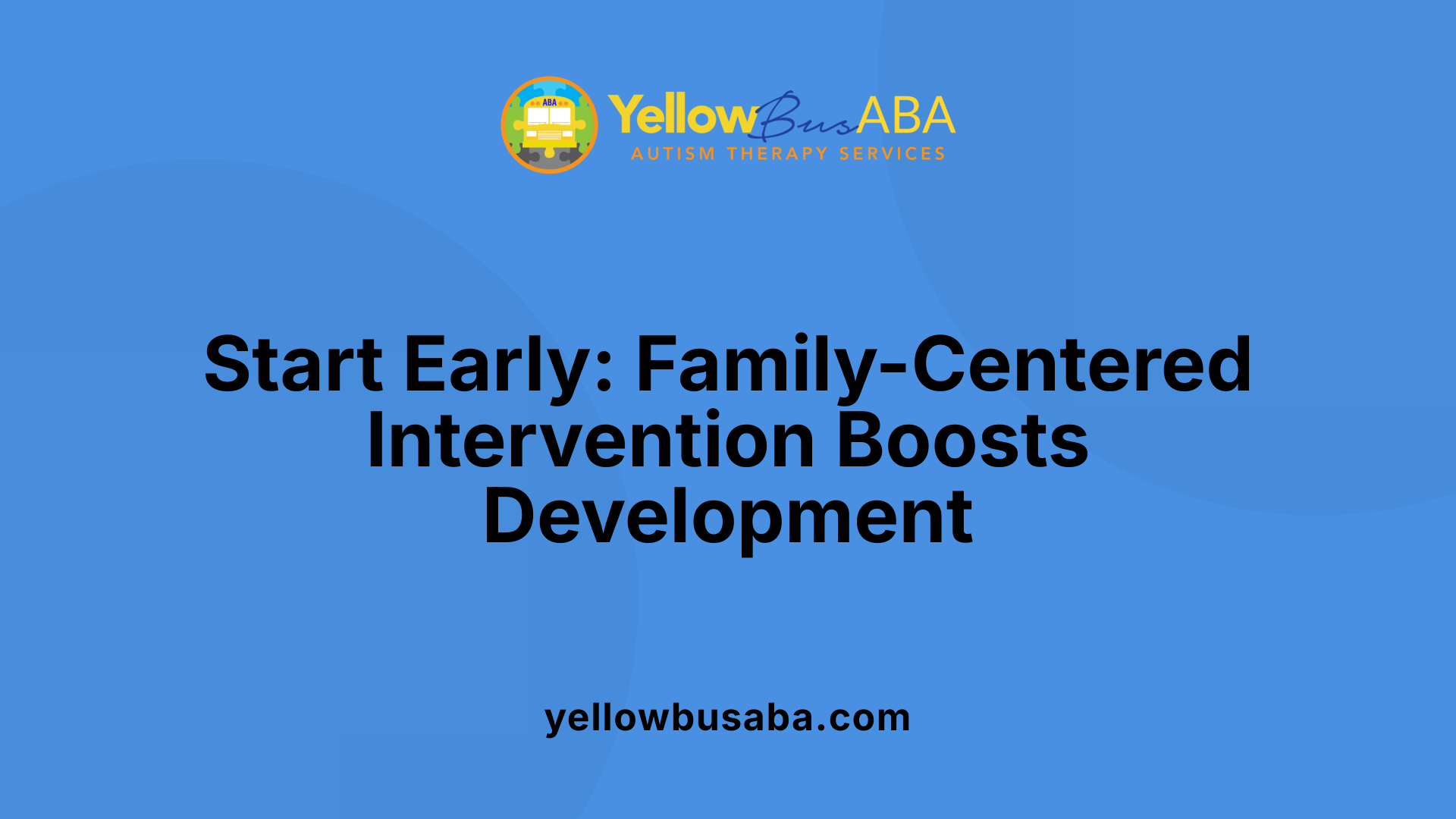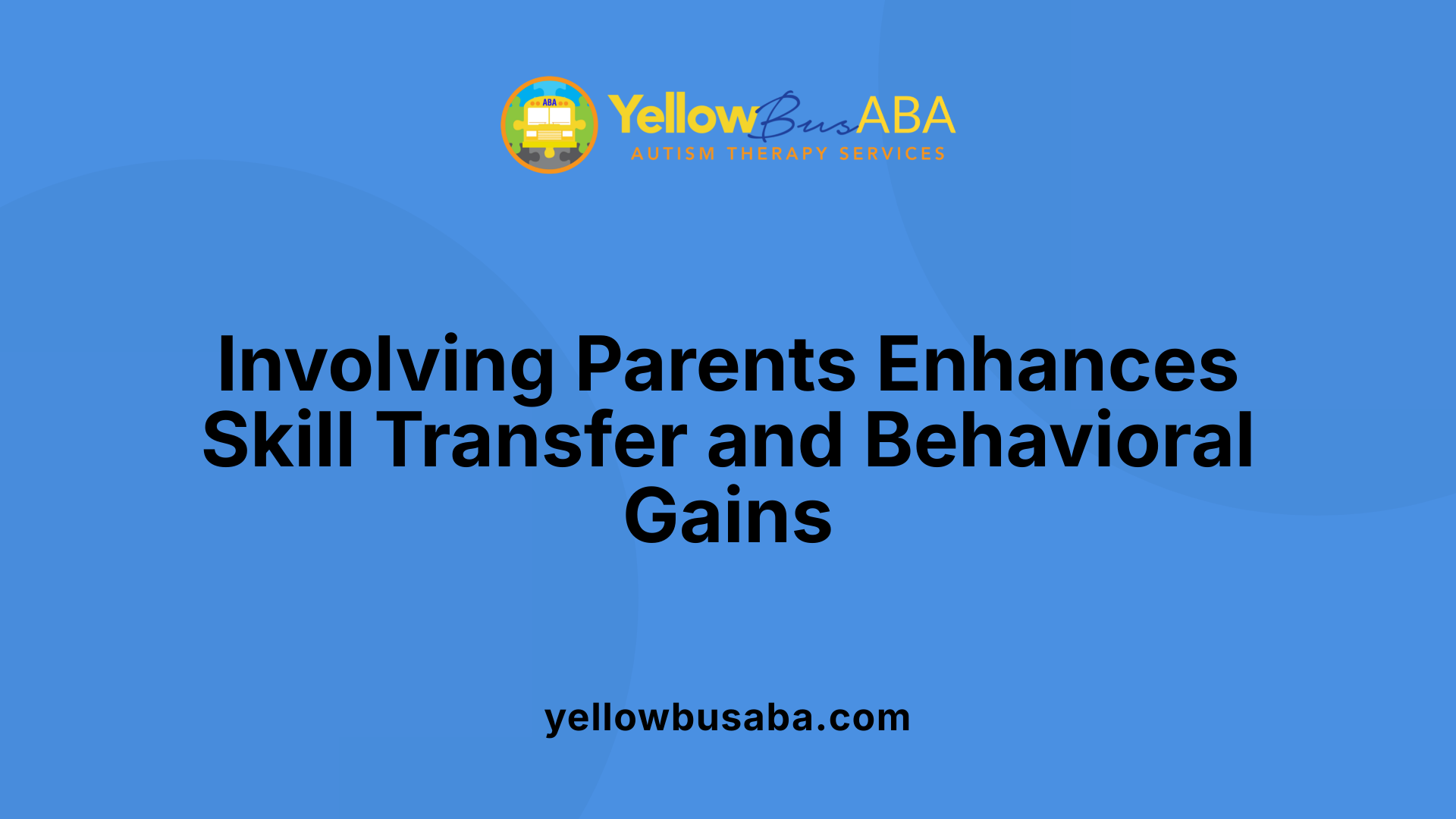Understanding the Critical Role of Parents in Autism Interventions
Parent involvement in center-based Applied Behavior Analysis (ABA) therapy is widely recognized as a cornerstone for successful intervention for children with autism spectrum disorder (ASD). Active participation by families not only accelerates skill acquisition but also ensures that intervention effects are sustained and generalized across various environments. This article explores why parental involvement is fundamental to ABA therapy, the strategies to foster meaningful engagement, and the profound impact it has on therapy outcomes.
The Therapeutic Impact of Parental Engagement
How does parental involvement lead to improved skill development in children undergoing ABA therapy?
Parents play a vital role in promoting rapid skill development in children with autism through active participation in ABA therapy. By attending training sessions and practicing targeted skills at home, parents reinforce positive behaviors and new skills learned during therapy sessions.
Engaged parents create consistent routines and environments that mirror therapy setting, which allows children to generalize skills more easily. Techniques such as visual supports, joint attention activities, and modeling behaviors are effectively implemented by parents, fostering communication and social skills.
Research shows that children with involved parents tend to master new skills faster and demonstrate greater independence. This active involvement accelerates overall progress and embeds learning into everyday life.
How does ongoing progress monitoring and data collection shape ABA strategies?
Consistent tracking of a child's progress through data collection enables therapists and parents to assess how well interventions are working. This measurable approach helps in fine-tuning strategies to meet the child's evolving needs.
Regular data sharing between parents and professionals ensures that therapy goals remain relevant and achievable. It also allows for timely modifications to behavior intervention plans, maximizing effectiveness.
Parental participation in monitoring progress not only enhances transparency but also empowers families to be more active in decision-making.
In what ways does parental involvement contribute to behavioral improvements and increased independence?
Children tend to show greater behavioral improvements when their parents are involved in implementing techniques like desensitization, sensory diets, and coping strategies at home. This consistency supports better behavior regulation and reduces maladaptive behaviors.
Furthermore, parental reinforcement of communication efforts and independent task completion fosters self-sufficiency. By creating a supportive and structured environment, parents encourage their child's autonomy in daily routines.
The collaborative effort between parents and therapists promotes a more comprehensive approach, resulting in sustained behavioral gains and enhanced independence.
| Aspect | Impact | Additional Notes |
|---|---|---|
| Skill Development | Faster mastery of skills | Home practice reinforces therapy goals |
| Progress Monitoring | Tailored strategies | Data guides intervention adjustments |
| Behavior & Independence | Behavioral improvements, more autonomy | Consistent reinforcement and emotional support |
Why is active parent participation essential in ABA therapy?
Research indicates that parental involvement is crucial for successful intervention outcomes. Their active role ensures continuity of therapy strategies across environments, promotes skill generalization, and maintains motivation.
Parents also help identify specific goals aligned with their child's needs, while their emotional support can reduce stress and anxiety, creating a positive atmosphere for learning.
In sum, engaging parents in ABA therapy fosters better communication, stronger bonds, and meaningful progress, ultimately leading to a more effective and holistic treatment process.
Strategies to Foster Effective Parental Participation

What are effective strategies to engage parents in ABA therapy?
Involving parents actively in ABA therapy is crucial for maximizing treatment success. One of the most effective approaches begins with comprehensive parent training. This training provides parents with essential knowledge of ABA principles and practical skills like data collection, reinforcement techniques, and managing challenging behaviors. Through methods such as modeling, role-playing, and visual aids, parents learn to implement strategies confidently at home.
Building a collaborative environment is vital. Regular communication, including progress reports and check-ins, keeps parents informed and engaged. Collaborating with therapists to set realistic, shared goals ensures that the therapy remains aligned with the child's needs and family priorities.
Personalization enhances parent involvement. Using visual supports, like picture schedules or social stories, helps clarify expectations and routines. Incorporating technology, such as telehealth sessions or apps for tracking progress, makes engagement more accessible and interactive.
Cultural sensitivity and tailored approaches ensure that interventions respect diverse backgrounds and individual family circumstances. Recognizing different cultural norms and language preferences fosters trust and makes parental participation more effective.
Ultimately, maintaining a positive, respectful relationship through consistent support and open dialogue encourages parents to become active partners. This collaborative effort results in more consistent reinforcement of therapeutic strategies across various settings, significantly boosting a child's developmental progress and enhancing emotional bonds.
The Significance of Early and Family-Centered Intervention

Why is parent involvement particularly important during early intervention?
Parent involvement is a vital component of early intervention for children with autism, as it significantly influences their developmental trajectory. Families are the primary environment where children from birth onward spend most of their time, making their role in therapy indispensable.
Engaged parents and caregivers can implement strategies that reinforce goals set during therapy sessions, promoting consistency across different settings like home, school, and community. This reinforcement helps children generalize their skills, such as communication and social behaviors, beyond structured therapy times. When parents participate actively, children tend to acquire skills faster, demonstrate greater independence, and show improved behavioral outcomes.
Programs like About Play, operating in South Carolina since 2014, exemplify the importance of family training. These initiatives focus on empowering parents with knowledge and practical skills, enabling them to support their child's progress effectively. Parent training sessions, whether in person or via telehealth, teach essential techniques like modeling behaviors, using visual supports, and reinforcement strategies.
Early intervention is particularly crucial because approximately 1 in 40 children in the U.S. is born with an early motor delay, which can be an early sign of developmental challenges. Prompt, family-centered support can help mitigate these delays, ensuring that children receive the necessary resources to reach milestones.
Research underlines that parent involvement not only accelerates skill development but also aids in emotional and behavioral stabilization. Parental participation fosters stronger parent-child bonds and facilitates more personalized, meaningful interventions aligned with the child's unique needs.
In conclusion, active family engagement in early ABA intervention creates a supportive, consistent environment that maximizes the child's potential for growth and development.
Behavior Management and Skill Generalization

What are the benefits of involving parents in ABA therapy for children with autism?
Parent involvement in ABA therapy plays a vital role in enhancing the child's progress and success. When parents actively participate in their child's therapy, they help reinforce learned skills and behaviors consistently across different settings, including home, school, and community. This consistency is crucial for the generalization of skills, meaning the child can apply what they learn in therapy to real-life situations.
Engaged parents can also support emotional well-being, reducing anxiety and creating a reassuring environment for their child. Through training and close collaboration with therapists, parents gain confidence and practical strategies to support their child's development effectively.
Collaboration between parents and therapy providers ensures that goals are aligned and strategies are reinforced at home. This teamwork accelerates skill acquisition and increases the likelihood of behavioral improvements.
Moreover, parental involvement facilitates ongoing progress monitoring. Families can observe subtle changes and provide valuable feedback, allowing therapists to tailor interventions and address emerging needs quickly.
Overall, when parents are active partners in ABA therapy, children tend to learn faster, demonstrate greater independence, and show more consistent improvements in social, communication, and behavioral domains, leading to more sustainable, long-term outcomes.
Building a Supportive and Consistent Environment

Why is parent involvement particularly important during early intervention?
Parent participation is a critical component in the success of early intervention programs for children with autism. When parents are actively involved, they help reinforce therapy goals through consistent support and practice at home. This consistency across different environments accelerates skill development and ensures behaviors learned in therapy are generalized into daily life.
Early intervention leverages the crucial role families play in a child's developmental pathway. Families can implement strategies that support communication, social, and motor skills, which are essential for long-term progress. Research indicates that children tend to master more skills and apply them in new settings when parents are involved in their therapy efforts.
Programs like About Play, operational in South Carolina since 2014, illustrate the benefits of family-centered approaches. They focus on empowering parents through training, equipping them with techniques and activities that can be integrated into everyday routines. Such engagement fosters not only faster development but also emotional bonds and shared therapeutic experiences.
Considering that approximately 1 in 40 children in the United States are born with early motor delays, timely family involvement becomes even more significant. Prompt, family-centered interventions ensure children receive continuous support and maximize their developmental potential. Overall, involving families in early intervention programs helps children reach important milestones more effectively, creating a strong foundation for lifelong growth.
Enhancing Long-term Outcomes and Family Well-being

What are the benefits of involving parents in ABA therapy for children with autism?
Engaging parents in ABA therapy offers numerous positive effects that support a child's development. When parents participate actively, they can reinforce skills learned during therapy in everyday settings, which promotes better generalization of behaviors across different environments like home, school, and community.
Parental involvement accelerates skill acquisition, making learning more efficient. It also helps reduce challenging behaviors by implementing consistent strategies and reinforcement techniques at home. As a result, children tend to show faster progress in social, communication, and behavioral domains.
This active participation enhances parents' understanding of their child's needs, triggers, and strengths. Increased confidence enables them to advocate effectively for their child's rights and access to services. Moreover, collaboration between parents and therapists improves communication, aligns therapy goals with family priorities, and ensures ongoing progress monitoring.
In addition, parents who are involved tend to foster emotional bonds with their children, creating a supportive environment that encourages emotional regulation and reduces anxiety. Family engagement also supports the emotional well-being of parents, helping to build resilience amid challenges.
Research shows that children whose parents are closely involved in ABA treatment achieve more meaningful and sustained improvements. They master skills more quickly and maintain progress over time. Family-centered approaches that empower parents and incorporate their insights are vital for maximizing long-term outcomes.
Involving families not only benefits the child's development but also enhances overall family functioning, strengthening relationships, and promoting a holistic approach to support. Building support networks with other families and professionals further reinforces the family's ability to sustain progress and navigate challenges.
Fostering a Partnered Approach for Lasting Success
The intrinsic value of parental involvement in center-based ABA therapy cannot be overstated. It acts as a catalyst for faster skill mastery, better generalization, and emotionally supportive environments that promote overall well-being. By engaging actively through training, goal-setting, and ongoing communication, parents not only contribute to their child's immediate progress but also help secure their future independence and social integration. Fostering a collaborative partnership between families and therapists ensures therapy is tailored, effective, and sustainable. Embracing family-centered approaches in ABA programs enhances the developmental trajectory of children with autism and fundamentally enriches family dynamics, paving the way for meaningful, lifelong improvements.
References
- The Importance of Parent Involvement in ABA Therapy Success
- The Role of Caregiver Involvement in ABA Therapy
- Impact of ABA Therapy: The Key Role of Parental Involvement
- Why Family Involvement Enhances ABA Therapy
- ABA Therapy in Center: How Involving Parents Makes a Difference
- The Role of Parental Involvement in ABA Therapy
- A Parent's Role in ABA Therapy Is More Important Than You Might ...
- The Importance of Parent Involvement in ABA Therapy
- ABA Parent Training: Tips and Strategies for Parents






